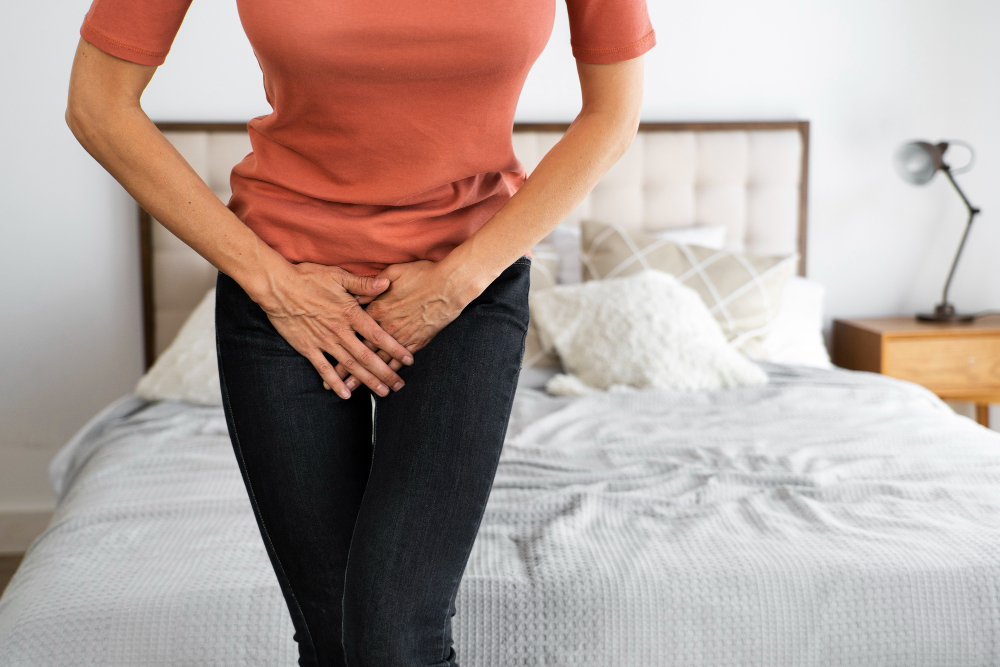
How to Stay Comfortable with Menopause and UTIs
Menopause is a transformative phase in a woman’s life, marked by new beginnings of another phase of life and associated unexpected challenges. The challenges physical, mental and emotional, together seem to invite more of the pesky, exacerbated ailments that a woman had never thought in her wildest dreams.
One such challenge triggered is a urinary tract infection, and that, too, is frequent, disrupting the days and discomforting the moment! But not to be brooded, let’s understand UTIs at menopause, their root causes, and explore how to prevent them.
What are UTIs and Why Do They Become Frequent at Menopause?
Urinary tract infections (UTIs) are bacterial infections that may infect any part of the urinary system however, bladder and urethra are easy to approach by the causal organism (Escherichia coli). It is a bacterium that typically lives in the intestines but can find its way into the urinary system.
During menopause, you might find yourself battling UTIs more frequently, and this is not a coincidence. The hormonal changes your body undergoes during this phase- particularly estrogen play a significant role in increasing your susceptibility to these infections.
Estrogen is not just important for regulating reproductive functions, it also keeps your urinary tract and vagina healthy. With the onset of menopause, estrogen levels plummet, the tissues in these organs become thinner, drier, and more fragile, making it easier for bacteria to invade. These changes, combined with a weakened bladder lining and reduced acidity in vaginal secretions, create a perfect storm for frequent UTIs.
What are the Causes of UTIs in Menopause?
Without a doubt, slumping hormones in your body during menopause are the primary cause behind the surge of this infection.
Here is a breakdown of the factors at play:
- Declining Hormones: Hormones specifically estrogen help maintain the lining of the urinary tract, keeping it strong and resilient enough to combat the pathogenic infection. During menopause, as the estrogen levels drop, tissues of the urinary tract including the urethra and bladder become thinner, fragile, and more prone to infection.
- Changed Vaginal Flora: Estrogen also keeps the vagina’s natural acidity in check, promoting the growth of healthy bacteria like Lactobacillus. Contrary to that, in estrogen-deficient conditions, the balance shifts, vaginal pH becomes more alkaline, and allows harmful bacteria like E. coli (the main cause of UTIs) to thrive.
- Weakened Bladder Function: With age menopause, the bladder’s ability to empty can be compromised, allowing bacteria to linger and multiply.
- Vaginal and Urethral Atrophy: As the vaginal tissues thin and become less elastic, the urethra becomes more susceptible to bacterial infections.
- Vaginal Dryness: It is most common in menopause and very much suitable for the entry and growth of bacteria in the urinary tract and causing infection.
- Sexual Activity: Menopause may lead to a reduction in sexual activities due to factors such vaginal dryness or discomfort during intercourse. However, for those who remain sexually active, the risk of UTIs may increase as with the dried and fragile vagina, bacteria thrive well and contribute to frequent UTIs.
- Weakened Immune System: With the growing age, the immune system may not function as efficiently as it did in younger years. A weakened immune response can make it more difficult for the body to fight off infections, including UTIs. The combination of weakened tissues in the urinary tract and a compromised immune system makes postmenopausal women more susceptible to frequent infections.
What are the Common Symptoms and Do they Differ during Menopause?
The symptoms of UTIs are more or less similar and you already have been familiar with them from your younger age. However, it is worth noting here that they are more intense during menopause.
Here is what to watch out for.
- Burning Sensation While Urinating: This is a classic hallmark of a UTI, caused by inflammation in the urinary tract.
- Frequent Urge to Urinate: Even if your bladder is nearly empty, you may feel the constant need to go to pee.
- Cloudy and Foul-smelling Urine: Changes in the appearance and foul odor of your urine are the red flags for UTIs.
- Pelvic Discomfort: Women suffering from UTIs feel a persistent ache or pressure in the lower abdomen or pelvic area.
Be cautious and don’t be ignorant! If UTIs are left untreated, they can escalate into a more serious kidney infection, causing fever, chills, and back pain. Therefore, it is essential to take early action if you suspect an infection.
How Frequent are UTIs in Menopausal Women?
Frequent UTIs during menopause are surprisingly common. Studies indicate that around 10-20% of post-menopausal women experience recurrent UTIs, defined as having two or more episodes of infections within six months. This issue is not just an inconvenience, it can significantly impact your quality of life, making routine tasks feel overwhelming due to the discomfort and fatigue.
Stepping Towards Preventing UTIs in Menopause
After knowing all the bad sides, it’s time for the solutions to curb UTIs and make menopausal women feel satisfactory. While UTIs during menopause can be frustrating, there are several strategies you can adopt to lower your risk and protect your urinary health:
- Hydration: Staying well hydrated is essential for preventing UTIs. Drinking plenty of water helps flush bacteria out of the urinary tract and keeps the bladder healthy. You can aim for at least 6-8 glasses of water per day to reduce the risk of infections.
- Topical Estrogen Therapy: One of the most effective treatments for reducing the risk of UTIs in post-menopausal women is the use of topical estrogen therapy. Unlike systemic hormone therapy, which affects the entire body, topical estrogen is applied directly to the vaginal area to help restore moisture, elasticity, and pH. This localized treatment can strengthen the vaginal and urethral tissues, making them less vulnerable to bacterial infections. Topical estrogen comes in various forms including creams, suppositories, and rings. It is generally safe for long-term use and can significantly reduce the frequency of UTIs in menopausal women.
- Frequent Urination: Emptying your bladder regularly is crucial in preventing UTIs. Holding in urine for long periods allows bacteria to multiply in the bladder. Try to urinate every 2—4 hours, especially If you feel the urge to go, and make sure to fully empty your bladder each time.
- Good Hygiene Practices: Maintaining proper hygiene can significantly reduce the risk of UTIs. Follow these tips to help prevent bacterial contamination:
- First, always clean the toilet sheets even if you are the only user, and then wipe yourself from front to back after using the bathroom to prevent bacterial contamination.
- Try to urinate before and after sexual activities to help flush out any bacteria that may have entered the urethra during intercourse.
- Avoid harsh soaps, douches, or feminine sprays, which can irritate the vaginal tissues and disrupt the natural balance of bacteria.
- Avoid using public toilets as they are the chief sources of spreading UTIs. If possible, use the female urination devices (also known as pee funnels). They allow you to urinate while standing. These devices are small; portables are easy to use in public restrooms or outdoor settings.
- Supplements: Cranberry supplements are specifically prescribed to avoid recurrent UTIs as they help prevent bacteria from adhering to the walls of the urinary tract. Besides this, fruits like pomegranates, pineapple, and vitamin C-rich fruits also promote urinary health and therefore should be taken as prophylactic treatment.
- Probiotics: It includes food containing Lactobacillus as it helps maintain a healthy balance of bacteria in the vagina and urinary tract. These beneficial bacteria can create an environment that is less conducive to the growth of harmful bacteria, potentially reducing the risk of UTIs. Probiotics are available as supplements or in fermented foods like yogurt.
- Antibiotic Prophylaxis: If you are experiencing frequent UTIs despite the above-mentioned regimens, a healthcare provider may recommend a low-dose antibiotic as a preventive measure. This may involve a small dose of antibiotics daily or after a specific trigger. However, long-term antibiotics should be monitored carefully to prevent the development of antibiotic-resistant bacteria.
When to Seek Medical Help?
If you experience any of the following symptoms, it is important to seek medical attention:
- Persistent UTI symptoms that do not improve with self-care measures.
- Blood in your urine.
- Fever, chills, or pain in your lower back as this could be an indication of kidney infection.
- Recurring UTIs i.e., two or three episodes of infection within six months.
Core Takeaway
While menopause brings with it a heightened risk of UTIs, being informed about the causes and preventive measures can help you navigate this phase more comfortably. From topical estrogen therapy to hydration and dietary adjustments, there are plenty of tools at your disposal to reduce the frequency of infections and maintain your quality of life. So, embrace this new chapter of life with confidence and take charge of your health.
Citations

Poonam Rawat







